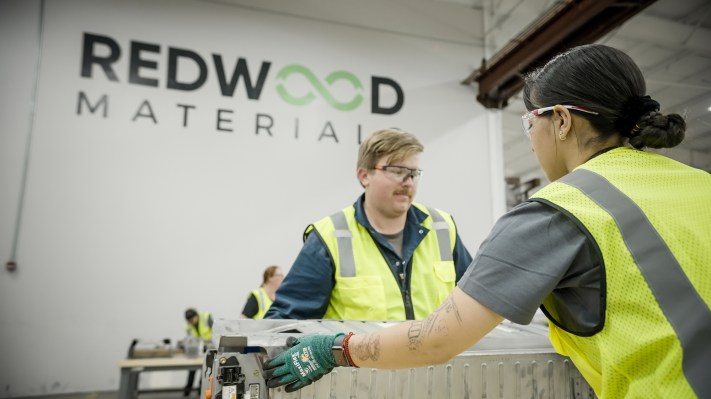Volkswagen of America and Audi have locked in a resurrection plan for old battery packs from their growing slate of EVs.
The two VW Group brands have contracted with startup Redwood Materials to recover and recycle end-of-life EV battery packs from its thousand-dealership network in the United States.
This won’t be the final resting place for the EV packs. Instead, Redwood will bring the packs to its Carson City, Nevada factory, where more than 95% of the metals found in these batteries — including nickel, cobalt, lithium and copper — will be recovered and used to remanufacture anode and cathode components. Those components will be sent back to U.S. battery cell manufacturers like its current partner Panasonic.
Under the deal, the new EV battery recycling collaboration will also integrate prototype batteries from Volkswagen’s research facilities such as the Battery Engineering Lab in Chattanooga.
Securing a supply of batteries — or the materials to make them — has prompted the automotive industry to partner with cell manufacturers and turn to companies like Redwood Materials. While Redwood is certainly not the only battery recycler out there, it is one of the buzziest. It has also expanded into the battery materials production business.
The company announced in September 2021 plans to build a $2 billion factory that will produce cathodes and anode foils up to a projected volume of 100 gigawatt-hour per year’s worth of materials; that’s enough for one million electric vehicles, by 2025. In January, Panasonic said Redwood will start supplying it with copper foil produced from recycled materials, a critical component of the anode side a battery cell.
Redwood Materials has landed partnerships with a number of battery suppliers and automakers over the past two years. It has locked in deals with Ford, Amazon, Toyota and other yet to be named companies — contracts that translate into 6 gigawatt-hour of lithium-ion batteries coming through Redwood’s Nevada factory doors today. That’s enough to build more than 60,000 EVs, according to the company. Redwood is also planning to expand and add another factory on the east coast to better serve Toyota and other regional partners.
The deal with Volkswagen of America and Audi further expands its market share in North America. Volkswagen of America and Audi didn’t disclose what volume of batteries will be sent to Redwood. If the automakers hit their EV targets, it promises to provide a significant bump in business; Volkswagen Group of America is aiming for 55% of its U.S. sales to be fully electric by 2030.
“The transition to electric transportation and clean energy is coming and the batteries powering these technologies present an incredible opportunity. As more and more batteries reach end-of-life each year, an increasing and infinitely recyclable resource becomes available,” Redwood Materials founder and CEO JB Straubel said in a statement. “Redwood and Volkswagen Group of America share a vision to create a domestic, circular supply chain for batteries that will help improve the environmental footprint of lithium-ion batteries, decrease cost and, in turn, increase access and adoption of electric vehicles.”
